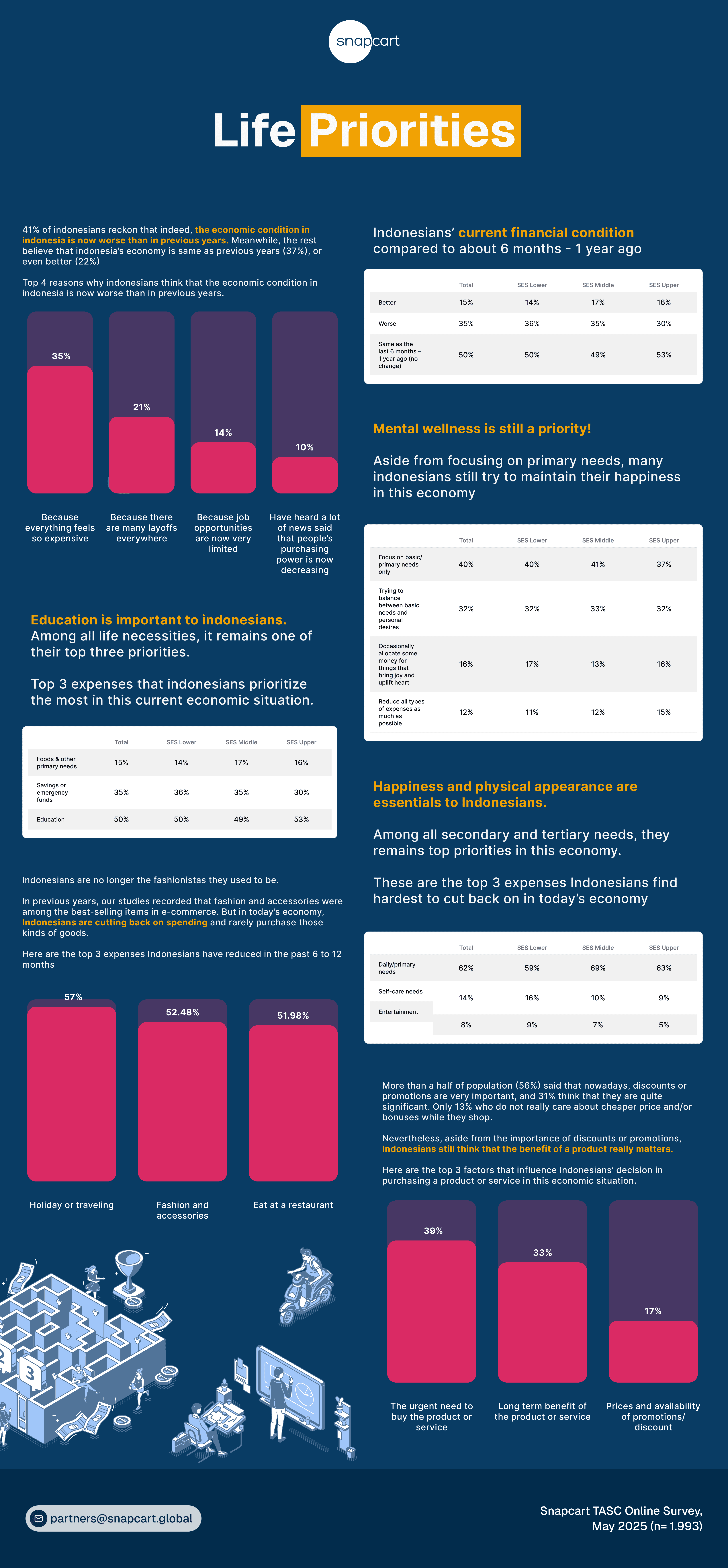In 2025, numerous news reports in Indonesia have informed the public that the country is facing a tough economic climate, supported by expert statements and supporting data[1].
Ironically, during the current economic conditions, we also often hear about Indonesians’ enthusiasm for attending concerts, purchasing viral products, or indulging in other tertiary goods and services.
Therefore, in May 2025, Snapcart conducted research to find out whether this financial pressure has affected—or even reshaped—Indonesians’ daily decisions and overall lifestyle, or whether it has not.
Check out the results of our study in this article.

Liza Amelia, Sales Executive of Snapcart in Jakarta (15/5) said, “According to this survey, 41% of Indonesians believe that the economic condition in Indonesia is worse than in previous years. Meanwhile, 37% feel that the condition has stayed the same, and 22% even say it has improved.”
The perception of economic decline is primarily driven by rising prices, with 35% of respondents saying that everything now feels so expensive. Another 21% attribute their concerns to widespread layoffs, while 14% highlight the scarcity of job opportunities. An additional 10% note that negative news about declining purchasing power has influenced their outlook.
Additionally, when asked to compare their current financial condition to about 6 months to a year ago, 35% of respondents say they are worse off, and only 15% feel their situation has improved. The remaining 50% report that things have remained the same. This pattern is fairly consistent across socioeconomic segments. Interestingly, people from lower SES groups are more likely to report worsening conditions, with 36% indicating a decline compared to 30% in upper SES groups.
Life Priorities
Despite economic pressures, Indonesians continue to value education and their mental well-being.
While 40% of respondents say they are focusing solely on primary needs, a significant 32% are trying to strike a balance between fulfilling basic needs and pursuing personal desires. Another 18% still allocate money toward things that bring them joy or uplift their mood. Only 12% are cutting back on all types of expenses. This indicates a widespread understanding that happiness and mental health are just as essential as financial security.
Meanwhile in terms of financial priorities, education holds strong as a leading necessity. Half of the respondents (50%) consider education one of their top three spending priorities. This trend is consistent across all SES levels, with the upper SES group even slightly more committed at 53%. Savings or emergency funds come next at 35%, followed by food and other primary needs at 15%. These spending patterns show that Indonesians are planning for both immediate needs and future stability, prioritizing essential and long-term investments over temporary comforts.
Lifestyle Cutbacks
Indonesians have noticeably reduced spending on non-essential items in the past 6 to 12 months. The most cutback expense has been holidays or travel, with 57% of respondents reporting a reduction in this area. Fashion and accessories, once among the top e-commerce sellers in Indonesia, have also taken a hit, with 52.48% cutting back. Dining out has been similarly affected, with 51.98% of respondents spending less at restaurants. This represents a major shift from previous years when lifestyle and leisure expenses held higher importance in consumer budgets.
Hardest Expenses to Let Go
Even amid economic pressure, certain categories remain nearly non-negotiable for many Indonesians. Topping the list are dairy and primary food needs, which 62% say they find hard to reduce. This is especially true in the middle and upper SES segments, with 69% and 63% respectively holding firm on this expense. Self-care products and services follow at 14%, and entertainment rounds out the list at 8%. These figures suggest that while people are tightening their belts, they still make room for necessities that affect their quality of life.
What Influences Indonesians’ Purchasing Decisions?
Promotions and discounts continue to play a role in consumer behavior, with 56% of Indonesians considering them very important. Another 31% say they are quite significant, while just 13% are not very influenced by price deals. However, when it comes to actual purchasing decisions, discounts are not the top priority. Instead, 39% of respondents cite an urgent need for the product or service as their main reason for buying. Another 33% prioritize the long-term benefits of the product or service, while only 17% list price promotions and availability as the key influence. This highlights a more thoughtful, value-driven approach to spending in today’s economy.
To be continued in part 2.
For more information about this article, contact liza.amelia@snapcart.global or haifa.chairunisa@snapcart.global.
Need to delve deeper into how people think and behave in response to a particular phenomenon? Reach us at partners@snapcart.global.
Reference:





